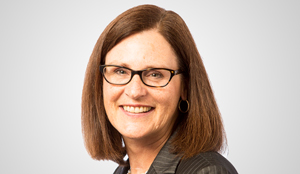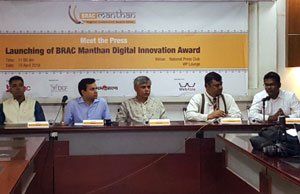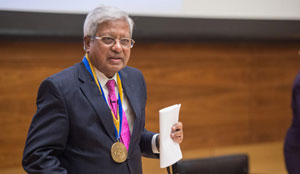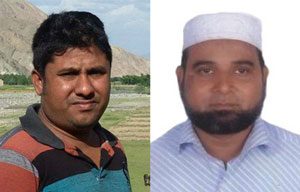
BRAC
National Safe Motherhood Day 2016
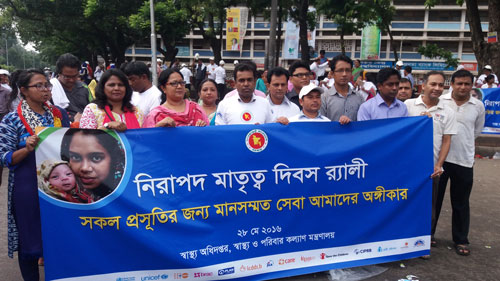
National Safe Motherhood Day 2016 was celebrated on May 28 across the country to create awareness on maternity care for pregnant and lactating women.
The health, nutrition and population programme (HNPP) of BRAC participated in the event along with the government through various activities. BRAC participated actively in all the government events at district and community level.
Let's have a look on BRAC's activities that were carried out on National Safe Motherhood Day 2016:
Activities done by essential health care (EHC) and maternal neonatal and child health programme (MNCH)
- Community health workers of essential health care (EHC) and maternal neonatal and child health (MNCH) programme mobilised the pregnant women to deliver anti natal care (ANC) and post natal care (PNC) from community clinic.
- Paramedics of MNCH rural programme provided free ANC/PNC to the women in char area.
- Manoshi midwives provided ANC/PNC to the women in slum areas in BRAC delivery centres.
- Field staff of HNPP attended a rally organised by the Ministry of Health of Bangladesh.
Activities done by Marketing Innovation for Health (MIH)
- Staff of MIH and other programmes of HNPP participated in the rally in seven districts and 51 sub-districts organised by government.
- Community health workers highlighted a range of topics like anti natal care, birth planning, usefulness of delivery kit among others during health education forum
- Community health workers of MIH programme mobilised mothers to deliver comprehensive ANC through government service centres.
Family Planning, Mother-Child Health and Adolescent Health Service and Campaign Week 2016: with successful participation of BRAC

Family planning, mother-child health and adolescent health service and campaign week 2016 was recently held across the country from 14-19 May. BRAC also observed this national event focusing on family planning counselling. BRAC worked intensively to promote family planning to create awareness among people concerning overpopulation, mother-child healthcare and adolescent health besides providing healthcare services to mothers, children and adolescents. Special daylong camps were organised at five maternity centres in Dhanmondi, Mirpur, Gulshan, Jatrabari and Uttara region of Manoshi project. Various family planning materials were distributed for free in those centres and people were advised on different methods of family planning. Md Delwar Hossain, director, directorate general of family planning, Dhaka division, Dr Md Abdul Haque AD, Dhaka and regional supervisor, FPCST-QAT, Mirza Kamrunnahar, DDFP, Dhaka district, Md Mizanur Rahman TFPO, family planning office Mirpur, Dhaka and other government officials visited the camps during the event.
BRAC responds to Cyclone Roanu in Bangladesh
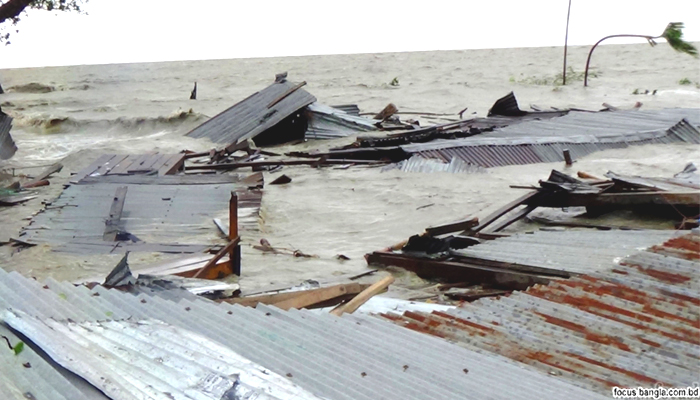
Photo credit: Kiron/Focus Bangla News
On May 21, 2016, a cyclone devastated the low-lying coastal regions of Bangladesh. BRAC is playing a leading role in providing relief, particularly in hard to reach areas, through its extensive reach in the south.
Cyclone Roanu hit the coast of Bangladesh at 11:00am on 21 May 2016. Winds reached speeds of 102 kilometres per hour and caused massive damage to houses, businesses and agricultural lands. Heavy rainfall inundated the southern coastal regions of the country and caused severe landslides. An estimated 50,000 houses were partially damaged and more than 24,000 properties were destroyed.
Roanu was half the strength of 2007’s Cyclone Sidr, which killed 3,447 people and caused millions of dollars in damage. A coordinated community response led by authorities and supported by BRAC and other agencies helped 500,000 people relocate to cyclone shelters the day before the cyclone hit. To date, 24 deaths have been recorded.
The cyclone forced the cancellation of the national Higher Secondary Certificate examinations. BRAC is providing water, food supplies and cash transfers to families who have been affected by the cyclone, as well as distributing special cash grants to exam candidates. A total of BDT 2 million has been allocated for relief efforts, focusing on specific areas that have not received immediate supplies.
The organisation’s priorities are to support the continuation of education and establish child-friendly spaces to ensure that children are busy with activities while out of school.
“Disaster responses traditionally focus on the immediate needs of survivors,” said Dr Muhammad Musa, executive director of BRAC. “Children and young people are often forgotten and become the most vulnerable group. We are focusing on meeting basic needs, while also ensuring that children are kept safe and can continue learning.”
In addition to providing relief, BRAC is participating in the government-initiated joint needs assessment for loss and damage. This is the first time that a Bangladesh-based non-governmental organisation has participated in this assessment.
BRAC is leading the first phase of the assessment in Patuakhali and co-leading the assessment in Cox’s Bazar, which were two of the most affected districts. Cyclone Roanu affected multiple districts including Chittagong, Cox’s Bazar, Chandpur, Naokhali, Feni, Laxmipur, Bagerhaat, Khulna, Barisal, Potuakhali, Pirojpur, Bhola, Borguna and Jalokathi – all areas where BRAC has programmes.
BRAC USA welcomes new President and CEO
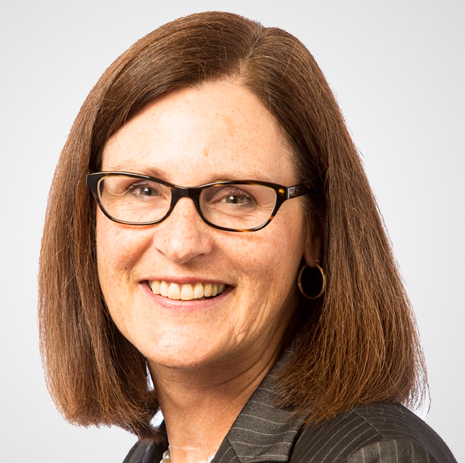
BRAC USA, the U.S. affiliate of BRAC, a global leader in creating opportunity for the world’s poor and the world’s largest nongovernmental development organisation, today announced the appointment of Donella Rapier as its new President & CEO. Donella will succeed BRAC USA founding President, Susan Davis, who completed ten years of outstanding service in December 2015.
BRAC is a development success story, spreading anti-poverty solutions born in Bangladesh to 11 other developing countries in Asia, Africa and the Caribbean. Donella will bring over 30 years of extensive finance, fundraising and non-profit management experience to its U.S. operations.
For the past four and a half years, Donella served as the Chief Development and Administrative Officer at Accion, a pioneer and global leader in microfinance and financial inclusion whose work spans nearly two dozen countries. Prior to that, she was the Chief Financial Officer at Partners In Health, a global healthcare organisation working in remote places where healthcare alternatives are limited or otherwise nonexistent, such as Haiti, Rwanda and Malawi. Earlier in her career, Donella spent more than a decade in senior leadership roles at Harvard University, including Vice President for Alumni Affairs and Development and Chief Financial Officer for Harvard Business School. Donella received her MBA from Harvard Business School and began her career at Price Waterhouse.
“BRAC USA is enormously fortunate to have someone with Donella’s range of skills and depth of experience as the new leader for our organisation,” said Lincoln Chen, Chair of the Board for BRAC USA. “She is a skilled builder of organisations and is deeply committed to empowering people and communities in situations of poverty.” Sir Fazle Hasan Abed, the Founder & Chairperson of BRAC Bangladesh, applauded the appointment: “Donella is a great addition to the BRAC family, bringing talent, expertise, and commitment to our work of ending poverty.”
“I am truly honored to be joining the remarkable BRAC family of organisations,” said Donella Rapier. “BRAC has made an enormous difference in the world and, by many measures, is one of the most successful organisations driving social change. I am eager to dive in and build on the excellent foundation laid by a decade of pioneering work to further BRAC’s reach and potential for even greater impact.”
Donella will join BRAC USA full time in July 2016.
A tribute to a champion of the deprived
I can think of few people who have done more for the world's deprived population than Fazle Hasan Abed. His contribution spans Bangladesh where BRAC, the organisation he founded in 1972, services close to 10 million of the country's underprivileged households. Through Abed's commitment to serve the world's deprived, BRAC has now extended its reach across the globe. It has invested its experience in rehabilitating the tsunami victims in Sri Lanka and the war-ravaged population in Afghanistan where two of its officials, working in high risk areas, were held hostage by the Taliban. BRAC is now reaching out on a large scale to serve the underprivileged populations in various regions of Africa. It has been actively engaged in Pakistan, Philippines, Tanzania, Uganda, South Sudan, Liberia and Sierra Leone. BRAC has even extended its reach across the Atlantic to Haiti. Read more
Workers deserve better protection
The government should establish a strong legal protection and permanent framework to ensure adequate compensation for the victims of factory disasters, experts said yesterday. They spoke at a seminar in the capital's Spectra Convention Hall, organised by Brac, on the eve of the third anniversary of the Rana Plaza tragedy. Three years ago, on April 24, the Rana Plaza building collapsed, crushing workers underneath and drawing the world's attention to the safety concerns. The country lost at least 1,136 lives, and 2,438 were injured and scarred forever. Read more
PSDF joins hands with BRAC
Punjab Skills Development Fund (PSDF) has joined hands with BRAC Pakistan, one of the largest non-governmental international development organizations in community health sector in the world which is based in Bangladesh.
PSDF Chief Operating Officer Ali Akbar Bosan and BRAC’s country representative& CEO Muzaffar-ud-Din signed the contract here.
Under the project, BRAC Pakistan will train 720 mature trainers who will impart training to 48,000 LHWs across the Punjab.
With improved skills, these LHWs would create awareness in community to improve health conditions at tehsil level, take active role to improve maternal, newborn and child health issues, help government to reduce child mortality rate and contribute in family planning services. Read More
BRAC launches the prestigious Manthan Awards
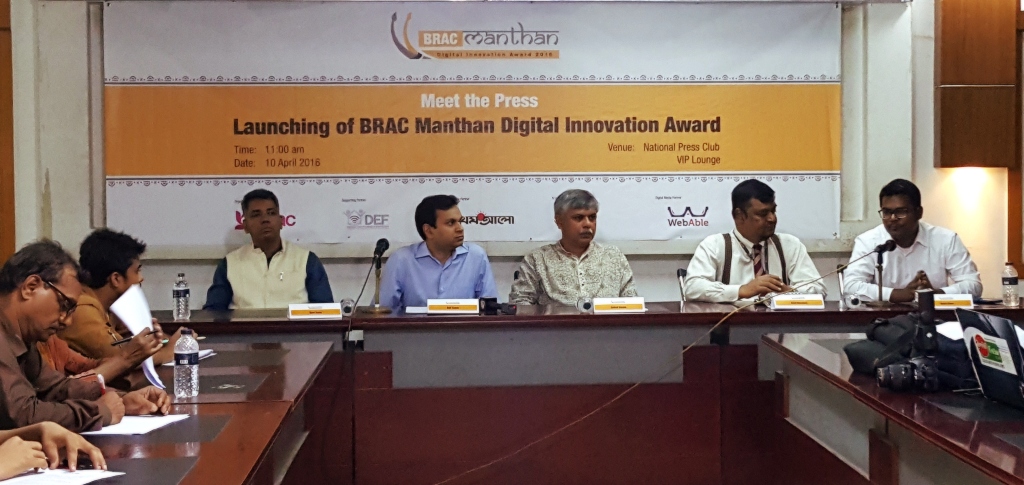
From left Ravi Guria, Asif Saleh, Anisul Hoque, K A M Morshed and Ovick Alam.
BRAC launched the prestigious Manthan Digital Innovation Award (BMDIA) 2016, on 10 April, for the first time in Bangladesh. The award, an off-shoot of the Manthan Awards in India, promotes the use of technology for the development and focuses on newer digital and mobile innovations.
BRAC in partnership with Digital Empowerment Foundation (DEF), an India-based non-profit launched the awards on National Press club today. Manthan Award, initiated in 2004 by Digital Empowerment Foundation promotes and recognises the contributions of individuals and organisations in the field of ICT for development.
Upon launching, deputy programme manager of DEF Ravi Guria said, "Bangladesh has been one of the most prominent participants in the Manthan award for years. We have to create an environment for the young innovators to make innovations that can have a positive impact in the most marginalised people of the country. This is why we are launching Manthan in Bangladesh."
From this year, Bangladeshi applicants will only be able to participate in the Manthan Award in India by winning the BRAC Manthan Digital Innovation Award in Bangladesh. Appreciating this initiative Anisul Hoque
from Prothom Alo said, "ten years before, a child from Bangladesh's Char area could not even imagine to have quality education, but thanks to technology, today we can ensure that. A child living in the remotest Char area can have the same education like a child living in the city. So we have to encourage the youth of our country to participate in this kind of initiatives which will take our country forward in the coming days."
The nine categories of the BMDIA 2016 are: e-business and financial inclusion, e-education, learning and employment, e-agriculture and ecology, e-governance and institutions, e-health, e-women, inclusion and empowerment, e-news, journalism and entertainment, e-culture, heritage and tourism, and m-content.
The registration for interested applicants would be open from 11 April to 10 June 2016. Notable individuals from the technology sector of South Asia will assess the applications on the quality of their content, impact of the solution, functionality of the product/service and benefits to people. The winners of the awards will be announced on September 2016. The winners of the BMDIA will get direct nomination to the Indian Manthan Awards and will represent Bangladesh there.
The press conference was moderated by BRAC's senior director Asif Saleh. Explaining the award nomination process he said, 'mobile and internet are bringing groundbreaking changes in the way people are interacting with the world around themselves. These newer digital services are reaching more people than ever and improving the quality of people's lives. BRAC wants to use that momentum and recognise those innovators who are catalysing these changes."
A number of Bangladeshi initiatives have won this award in the previous years in India, including A2i's e-purjee platform, bKash, Maya.com.bd, British Council's EITA project with BRAC, Amader Kishorganj, Infolady, Amar Desh Amar Gram. As the number of Bangladeshi applicants are rising for the Manthan Awards, BRAC has decided to bring this award in Bangladesh to promote and encourage a positive and working environment in ICT for development in here.
Ovick Alam from WebAble, the digital media partner of this award said, "122 million people in Bangladesh use mobile and 63 million use internet connection. Only 55% of this population is urban. We need to bring a paradigm shift from being urban focused to going country-wide. BRAC Manthan stands for that shift. It encourages people all over the country to bring tech-based solutions for mass people."
Present at the conference were BRAC's senior director Asif Saleh, director of advocacy and technology KAM Morshed, Prothom Alo's associate editor Anisul Hoque, Prothom Alo's development programme coordinator Munir Hasan, DEF's deputy programme manager Ravi Guria and WebAble Digital's co-founder and director Ovick Alam.
Prothom Alo is an associate partner of this initiative and WebAble Digital is the digital media partner of BMDIA 2016 while Channel 24 is supporting this initiative as the TV media partner.
For more information and nomination please visit http://brac.manthanaward.org/
Sir Fazle Hasan Abed receives Thomas Francis, Jr. Medal
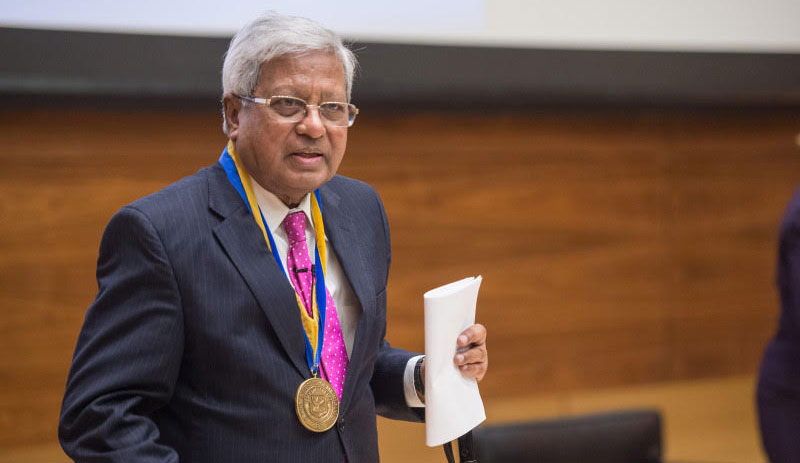
Sir Fazle Hasan Abed, KCMG, founder and chairperson of BRAC, was given the Thomas Francis, Jr. Medal in Global Public Health award by the University of Michigan. Mark Schlissel, president of University of Michigan presented the medal at a ceremony at the Ross School of Business on April 6, 2016.
Sir Fazle has been recognised for his advancement of global public health and work to establish a healthier future for people living in poverty worldwide. The medal, periodically awarded to a global leader whose work addresses the most pressing global health challenges, honours the legacy of the University of Michigan epidemiologist who mentored Dr Jonas Salk in his development of the polio vaccine.
"It is indeed a great honour to receive the Thomas Francis, Jr Medal in Global Public Health," said Sir Fazle at the award ceremony. "It gives me tremendous pleasure and I thank the University of Michigan for bestowing this prestigious award on me."
"In global development, it is not a lack of new and bright ideas that is impeding progress but rather our ability to implement these ideas well, effectively and at scale," said Sir Fazle. "There is much excitement today about the potential of new technology to end human poverty. This can make us forget that many solutions already exist. We can reach millions more today by focusing less on 'what' and more on 'how'."
In the 1970s, BRAC pioneered a new approach to treating diarrheal disease in Bangladesh. Known as Oral Rehydration Therapy (ORT), BRAC reached 12 million mothers almost entirely through person-to-person education, revolutionising health delivery in the country. Bangladesh now has the world's highest ORT usage rate, providing a case study in how to do a good thing better. In addition, between 1990 and 2011, Bangladesh saw a two-thirds reduction in mortality rates for children under the age of five. As a result, the country met the 2015 health standard set by the United Nations.
Today, BRAC breaks the cycle of contamination caused by limited access to toilets, latrines and safe water sources, especially in rural areas. Nearly one in three people worldwide – 2.5 billion – don't have access to adequate sanitation and nearly one in nine people – 800 million – don't have access to clean water.
By focusing on innovation, technical assistance, and community-based education, BRAC water and sanitation for health (WASH) committees have reached 38 million people, largely in rural areas of the country.
BRAC officials abducted in Afghanistan have been released
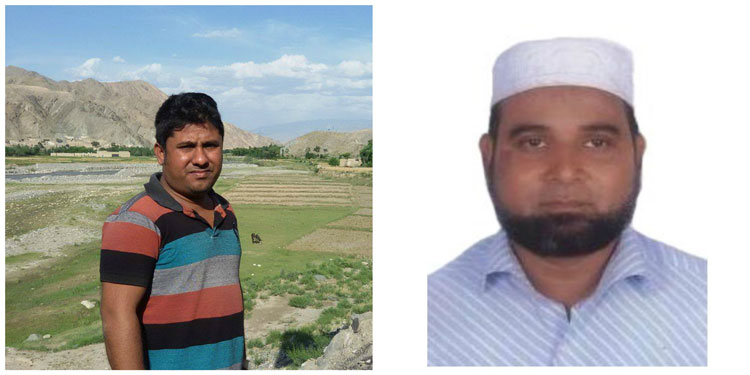
BRAC Afghanistan's staff KM Sirazul Islam (left) and Mohammad Swakat Ali (right)
Two Bangladeshi BRAC officials abducted in Afghanistan have been released after 18 days. Both Haji Swakat (50), and Md Sirajul Islam Sumon (37) returned unharmed to BRAC Kabul office on the morning of April 4.
Regional director of BRAC International, Asia, Jalal Uddin Ahmed said, "The release was ensured through the mediation of the local Surah leaders. We are very happy on their safe return. Both have spoken to their respective families in Pabna." Jalal Uddin Ahmed went to Kabul right after the abduction on 17 March.
Executive director of BRAC International Faruque Ahmed said, "We are relieved that our colleagues are safe and unharmed. From the very beginning ensuring their safe release was our top priority and I am glad that we have been able to achieve this. We are grateful to the families for their patience during the last two weeks." He also thanked both the governments of Afghanistan and Bangladesh, provincial governors, police and Surah leaders of Baghlan and Kunduz provinces for their relentless support in this critical time.
Haji Swakat and Md Sirajul Islam Sumon were abducted from Kunduz, Afghanistan on 17 March on their way back to Baghlan office after a field visit.
Join the world’s biggest family


